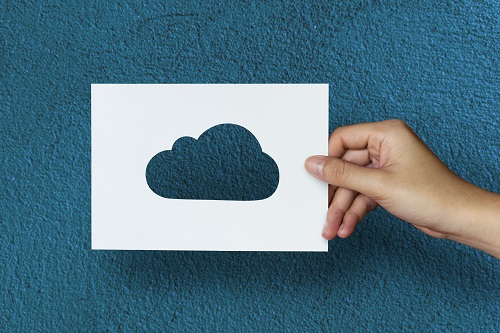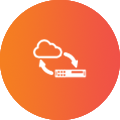Cloud backup is the most modern solution for protecting the data and digital infrastructure of a company.
For a modern business, information is its main tool and essential asset at the same time. Different data can be hugely valuable, as the foundation for the operation of the company, as a basis for developing its business strategy, and as its financial documentation.
This value attracts many threats: from dishonest employees and hackers to breakdowns, technical failures and natural disasters. Any data-related loss is a liability for the reputation and production capacity of the company, for its coffers and even specific people.
All of this creates the need for archiving and backing data up. Data backup is not a luxury, it is a regular tool; a guarantee that your valuable data will be protected, and not lost. At the same time, it can provide quick access to the data in any emergency. This is an unavoidable prerequisite for business continuity and being able to provide the corresponding services in any situation.
However, while this all looks good and convincing in theory, it does not always see implementation in practice. It would be optimistic to say that half of all companies have everything backed up, and when it comes to the backed-up data being up-to-date, to updating your backups regularly, the situation is even more disappointing. The reason is that you have to do and spend a lot to set up your own storage solution. There’s a need for significant investments in the hardware, and providing the necessary software infrastructure. The bottom line is that some people don’t spend enough, some ignore the problem completely, and some sit and hope that whatever they are doing will work.
Learn more how to effectively plan data backup!
 However, there is a solution that makes life easier for businesses and those who are in charge of their data. And it is saving backups in a cloud. This was rather unusual a few years ago, but everything has changed now because of two things:
However, there is a solution that makes life easier for businesses and those who are in charge of their data. And it is saving backups in a cloud. This was rather unusual a few years ago, but everything has changed now because of two things:
- an explosive growth in network bandwidth, i.e. the amounts of data that can be transferred through data channels, and the rate of such transfer;
- improvements in technologies that make it possible to optimise data centre capacity.
Today, even a major business that handles enormous amounts of digital data can realistically decide to stop using its own physical infrastructure (e.g. RAIDs), and opt for the cloud solution instead.
Advantages
Cloud backup has a few clear advantages that can make life easier for a business.
- Ability to fully automate the process. You can set up the backup schedule on your own, with appropriate software. Some people may find it better to have a system that does regular backups, and some may go for fine-tuning the system to copy the data at the specific points in time indicated.
- Access to the archive from anywhere on the planet. Unlike a local archive that can become isolated for various reasons, a cloud-based platform is always available whenever there is an internet connection.
- Ability to copy not only files, but all classes of data. The latter include applications, software, services, digital services, current settings and the state of the operating system. This means that you can not only get backup files from the cloud, you can restore the entire infrastructure of the company in a minimal amount of time.
- Flexibility in settings: ability to produce selective backups. In other words, data will only be backup-copied into the cloud if there are settings for backing up those data. This can optimise the issue of disk storage space (i.e. it is simply more economical), and the backup and recovery processes.
- Not having your own infrastructure also obviates any problems looking for trained IT staff and organising their work. Using the specialised software provided by the cloud service does not require any special skills or expertise, and using it is quite easy and intuitive.
- Ability to integrate cloud backups with the local standby system, with the subsequent synchronisation of all files. This is a good solution for those who seek to build a system that is as secure as possible, distributing data copies into different storage media and physical sites.
- Economy. Paying for some space on a network drive costs much less than preparing and maintaining your own hardware.
- Flexibility in scaling. When dealing with real hardware, you always have to buy more than you currently need, so that you can avoid a sudden deficit of storage space or processing capacity. With cloud infrastructure, you can get as much reserve space as you need. You just pay more for the gigabytes of reserve as necessary, without any additional hassle.
- High security: modern centralised security solutions are very capable of protecting all the data stored on the server.
Special features
Cloud backup certainly has its special elements that you have to keep in mind when making your choice.
- Despite broadband internet and the capacity of the modern network, if you have large amounts of data, its transmission can become a bottleneck. This is not a reason for rejecting the cloud outright, but these considerations should be a part of the planning, so that the resulting performance does not come back to you with a nasty surprise.
One important point here is the specific technical conditions that the service provider agrees to meet: this is something that must be looked into and negotiated when signing the contract. - Dependence on the service provider and server owner. You might encounter purely organisational problems here: specifically, the services promised not being the same as the services actually provided. This means that you have to meticulously look through all the solutions and understand the way cloud services, automated backup services etc. work. You must clearly know what service you intend to pay for. This is not just about whether the service fees are appropriate, it is about the fact that you are risking data that are much more valuable. Preparing detailed contracts that lay down all the conditions, technical specifications etc. is another point worth mentioning here.

Overall, handling all the main risks of cloud backup depends on choosing a good service provider. The solution itself does not have major problems.
Technical points
- The circulation of data between the company network and the remote storage facility takes place via high-speed data channels, where the bandwidth of the channel in question is the only limiting factor.
- When producing cloud data backups, the processing of the data copied can take different forms:

copying the data directly into the reserve storage

replicating the data already present in the cloud

archiving previous copies of the files for long-term storage
- The backup procedure should be set up so that it takes place during off-hours. In other words, whenever this task won’t create any critical loads, or affect the operation and stability of the infrastructure. The off-hours are usually at night or in the evening, but the specific time for dealing with the backups should be selected individually for every company.
- If it is urgently necessary, the backup procedure can be done manually, but it takes a long time, it is complex, and adds the risk of creating errors. Using specialised software makes more sense, as it simplifies all the handling of the backups, and makes it possible to search the entire array and recover the fragments you need. Also, working via this software is more secure than dealing directly with the cloud.
Cloud services for small businesses
The data backup situation is even worse for smaller companies. On the surface, it should be the other way around: the less business you’ve got, the less information you have to handle. Why would a small company need data mirroring and backups? Where’s the problem?
There are actually two problems:
- One, there is often no server infrastructure to begin with, and there is no understanding of how to organise data security. There are no replicated servers, no storage systems, not even something as trivial as a RAID on the chief accountant’s computer. Hard disks, flash drives, phones and all sorts of other devices become the hardware used for backing up files. The reliability (both technical and organisational) of these storage media is negligible. It is worth separately mentioning the situation when the backup is kept on the same computer, on the same hard drive or logical drive, just in a different folder: this is as common as it is dangerous.
- Important data are backed up occasionally and without any system, if at all. These backups may not contain all the information you need, or be hopelessly out of date; they can be lost or mixed up with other stuff.
With this kind of ‘security’, any of the emergencies listed below could bring a business to a standstill:
- mechanical failures on the server, or on the computer;
- hard drive failure (for any reason);
- actions by encryption software;
- absence of hard drive space;
- the only IT specialist at the company quits, and all information about the backups is lost as a consequence;
- there is a blackout, or an internet connection failure at the company office;
- an employee makes a mistake (due to malice, or lack of experience or attention) and damages the database.
Data backup via a data centre will provide insurance against any of these problems. With it, small amounts of data will take a tiny investment, which is particularly important for businesses with small budgets.
Back
